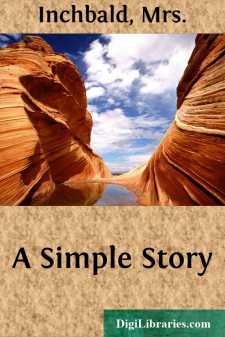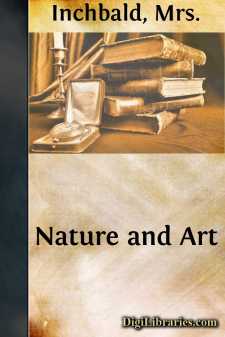Categories
- Antiques & Collectibles 13
- Architecture 36
- Art 48
- Bibles 22
- Biography & Autobiography 813
- Body, Mind & Spirit 142
- Business & Economics 28
- Children's Books 16
- Children's Fiction 13
- Computers 4
- Cooking 94
- Crafts & Hobbies 4
- Drama 346
- Education 46
- Family & Relationships 57
- Fiction 11829
- Games 19
- Gardening 17
- Health & Fitness 34
- History 1377
- House & Home 1
- Humor 147
- Juvenile Fiction 1873
- Juvenile Nonfiction 202
- Language Arts & Disciplines 88
- Law 16
- Literary Collections 686
- Literary Criticism 179
- Mathematics 13
- Medical 41
- Music 40
- Nature 179
- Non-Classifiable 1768
- Performing Arts 7
- Periodicals 1453
- Philosophy 64
- Photography 2
- Poetry 896
- Political Science 203
- Psychology 42
- Reference 154
- Religion 513
- Science 126
- Self-Help 84
- Social Science 81
- Sports & Recreation 34
- Study Aids 3
- Technology & Engineering 59
- Transportation 23
- Travel 463
- True Crime 29
A Simple Story
by: Mrs. Inchbald
Categories:
Description:
Excerpt
A Simple Story is one of those books which, for some reason or other, have failed to come down to us, as they deserved, along the current of time, but have drifted into a literary backwater where only the professional critic or the curious discoverer can find them out. "The iniquity of oblivion blindly scattereth her poppy;" and nowhere more blindly than in the republic of letters. If we were to inquire how it has happened that the true value of Mrs. Inchbald's achievement has passed out of general recognition, perhaps the answer to our question would be found to lie in the extreme difficulty with which the mass of readers detect and appreciate mere quality in literature. Their judgment is swayed by a hundred side-considerations which have nothing to do with art, but happen easily to impress the imagination, or to fit in with the fashion of the hour. The reputation of Mrs. Inchbald's contemporary, Fanny Burney, is a case in point. Every one has heard of Fanny Burney's novels, and Evelina is still widely read. Yet it is impossible to doubt that, so far as quality alone is concerned, Evelina deserves to be ranked considerably below A Simple Story. But its writer was the familiar friend of the greatest spirits of her age; she was the author of one of the best of diaries; and her work was immediately and immensely popular. Thus it has happened that the name of Fanny Burney has maintained its place upon the roll of English novelists, while that of Mrs. Inchbald is forgotten.
But the obscurity of Mrs. Inchbald's career has not, of course, been the only reason for the neglect of her work. The merits of A Simple Story are of a kind peculiarly calculated to escape the notice of a generation of readers brought up on the fiction of the nineteenth century. That fiction, infinitely various as it is, possesses at least one characteristic common to the whole of it—a breadth of outlook upon life, which can be paralleled by no other body of literature in the world save that of the Elizabethans. But the comprehensiveness of view shared by Dickens and Tolstoy, by Balzac and George Eliot, finds no place in Mrs. Inchbald's work. Compared with A Simple Story even the narrow canvases of Jane Austen seem spacious pictures of diversified life. Mrs. Inchbald's novel is not concerned with the world at large, or with any section of society, hardly even with the family; its subject is a group of two or three individuals whose interaction forms the whole business of the book. There is no local colour in it, no complexity of detail nor violence of contrast; the atmosphere is vague and neutral, the action passes among ill-defined sitting-rooms, and the most poignant scene in the story takes place upon a staircase which has never been described. Thus the reader of modern novels is inevitably struck, in A Simple Story, by a sense of emptiness and thinness, which may well blind him to high intrinsic merits. The spirit of the eighteenth century is certainly present in the book, but it is the eighteenth century of France rather than of England. Mrs. Inchbald no doubt owed much to Richardson; her view of life is the indoor sentimental view of the great author of Clarissa; but her treatment of it has very little in common with his method of microscopic analysis and vast accumulation. If she belongs to any school, it is among the followers of the French classical tradition that she must be placed. A Simple Story is, in its small way, a descendant of the Tragedies of Racine; and Miss Milner may claim relationship with Madame de Clèves.
Besides her narrowness of vision, Mrs. Inchbald possesses another quality, no less characteristic of her French predecessors, and no less rare among the novelists of England. She is essentially a stylist—a writer whose whole conception of her art is dominated by stylistic intention. Her style, it is true, is on the whole poor; it is often heavy and pompous, sometimes clumsy and indistinct; compared with the style of such a master as Thackeray it sinks at once into insignificance. But the interest of her style does not lie in its intrinsic merit so much as in the use to which she puts it. Thackeray's style is mere ornament, existing independently of what he has to say; Mrs. Inchbald's is part and parcel of her matter. The result is that when, in moments of inspiration, she rises to the height of her opportunity, when, mastering her material, she invests her expression with the whole intensity of her feeling and her thought, then she achieves effects of the rarest beauty—effects of a kind for which one may search through Thackeray in vain....




